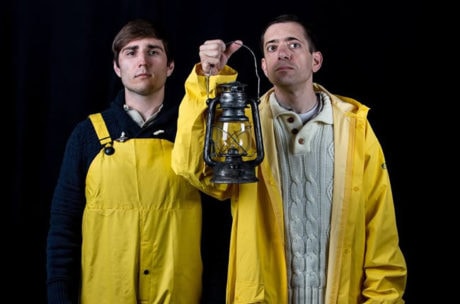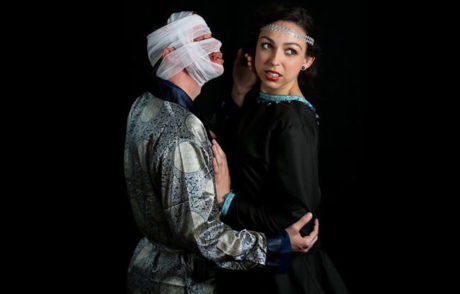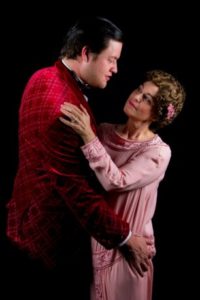As the local go-to theater company for carrying on the Grand Guignol tradition, Molotov Theatre Group mounts some of the most interesting combos of style and substance in town. There are a few other small theaters that also specialize in productions reflecting a particular historical theatrical esthetic (Faction of Fools’ inventive custodianship of commedia del’arte comes to mind). But it’s my impression that in depicting dark recesses of human nature using storytelling conventions of the horror genre, Molotov always nails something unsettling or exposes something buried that is more than the sum of its gore.
Case in point: its current production, Blood, Sweat & Fears: A Grand Guignol Sick Cabaret.

Beforehand the actors, attired in Roaring 20s evening wear, mingle with the audience in the lobby (the costumes by Jesse Shipley are smashing). Several pass among us proffering platters with shots of port. The speakeasy feel continues inside as the Chanteuse (a vibrant Jen Bevan) sings a series of songs—including “I Won’t Dance,” “Makin Whoopee,” “Anything Goes,” and “I’m in the Mood for Love”—that run through the show. Mistress of ceremonies Bella Donna (a cheeky Mallory Shear) mischievously toys with the audience as she sets up each of three short plays that comprise the program.
Translated from French by Richard Hand and Michael Wilson, the three plays are actual scripts from the Grand Guignol tradition (the texts sound fresh, not the least archival). Director Alex Zavistovich, Molotov co-founder and artistic director, has shaped them into an evening that is creative, smart, and entertainingly eccentric. (See his commentary “A Textbook Case of Horror: Molotov’s Blood, Sweat & Fears Goes Authentically Old School.”) On top of the shock and horror inscribed in the period texts, Zavistovich has layered a musical nostalgia and an old-timey cinema sensibility that contribute to the show’s appeal (credit also goes to Composer Gregory Thomas Martin, Lighting Designer Pete Vargo, Set Designer Mary Seng, and Piano Accompanist Jill Parsons).
Popular horror entertainments in the Grand Guignol genre are typically considered indifferent to ethics. Though I don’t doubt Blood, Sweat & Fears could be assumed to fit that amoral mold, I would argue that there is a theme running through the evening that is anything but oblivious to values. I began to track it when I noticed that in all three playlets, male characters are dealing with an affliction associated with sex. (This should come as no surprise, given that in slasher films, today’s descendants of Grand Guignol, sexuality and horror are joined gruesomely at the hip.)
In the first play, The Lighthouse Keepers (directed by Assistant Director Elliott Kashner), we meet Brehan (Zach Brewster-Geisz) and his son Yvon (Brian Kraemer), who are tending an isolated lighthouse alone for a month-long stint. Yvon is madly in love with a young woman he intends to marry and longs to be with again, but his mad passion becomes viscerally explicit in a metaphorical affliction that Kraemer enacts chillingly.

In the second play, Tics—Or Doing the Deed, the sexual affliction is handled purely for laughs. We meet two hoity-toity couples—Dr. Martin (Alex Miletich IV) and Mme. Martin (Annette Mooney Wasno), and Monsieur de Merliot (Gray West) and Mme. de Merliot (Katie Culligan)—and we learn that both husbands are troubled by a hilarious post-coital tic (the outrageous way Miletich physicalizes his is particularly fun to watch).

Turns out the servant Adrian (Brian Kraemer again), after shagging the maid Venus (Lizzy Colandene), develops a tic of his own to tickle us with.
In the third play, The Final Kiss, a romance has gone ruinously wrong. We meet a man whose face is wrapped in gauze—Henri (David Dieudonne)—because the woman he loved but left has thrown acid on his face in revenge. In constant agony, he is tended by a Nurse (Jennifer Restak) and Doctor (Zach Brewster-Geisz again).
When he receives a visit from his former inamorata Jeanne (Fabriolla Da Silva), the metaphor of facial disfigurement takes “love hurts” to Sadean dimensions. (Fight Choreographer Mallory Shear staged their shocking confrontation.)
With Blood, Sweat & Fears: A Grand Guignol Sick Cabaret, Molotov Theatre mixes classic horror with physical comedy and a lounge act and concocts a fizzy, funny cocktail that packs a sobering wallop.
Running Time: 85 minutes, with no intermission.
Blood, Sweat & Fears: A Grand Guignol Cabaret plays through July 31, 2016 at Molotov Theatre Group performing at DCAC-(District of Columbia Arts Center) – 2438 18th Street, in Washington, DC. For tickets, purchase them online.





